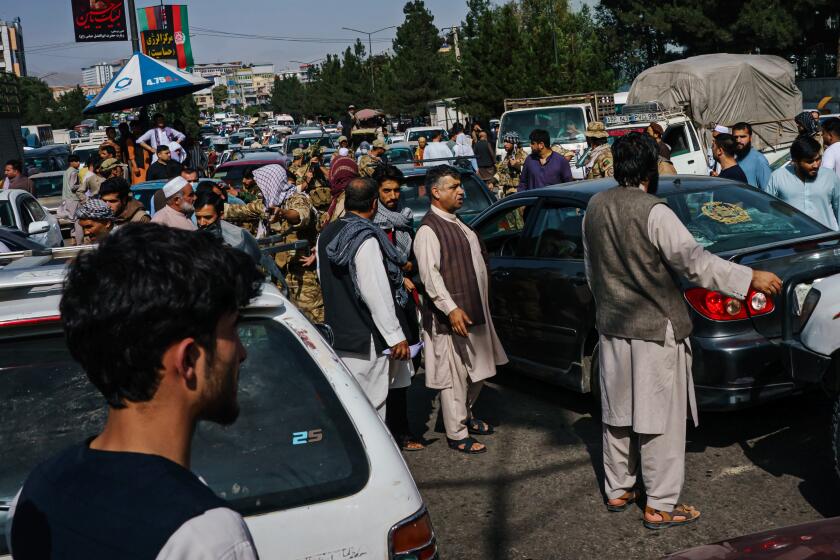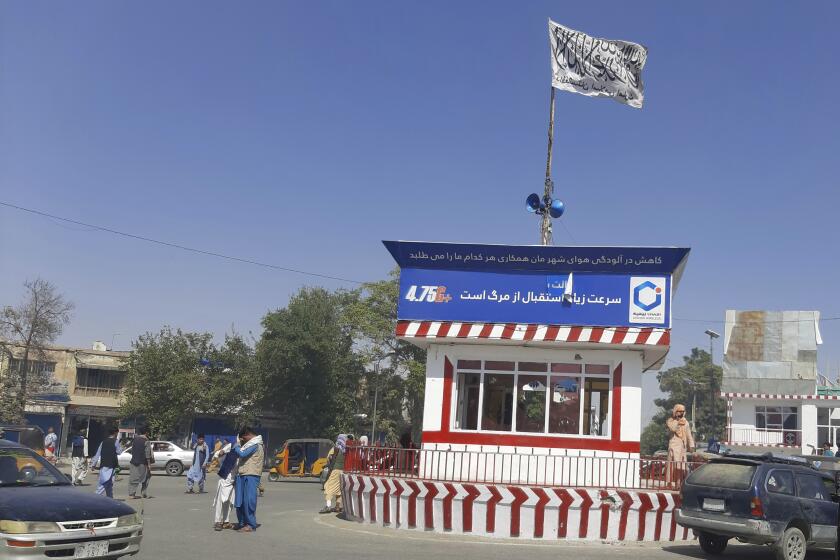The Taliban won. Here’s what that could mean

The U.S. has suspended evacuations from Afghanistan after people rushed the Kabul airport in an attempt to flee the country. Hundred of additional American troops are being sent to help safeguard the airfield after U.S. forces killed two armed individuals.
- Share via
DUBAI, United Arab Emirates — Afghans woke fearfully to both a new and old reality Monday with their country under the control of the Taliban, the Islamic fundamentalist group that ruled Afghanistan with a brutal hand for five years before a U.S.-led invasion ousted it from power in 2001.
The Taliban captured major population centers with breathtaking speed last week, culminating in the fall Sunday of the capital, Kabul, and the ongoing flight of foreign diplomats, including ones from the U.S. There were reports Monday of chaotic scenes — and at least two deaths — at Kabul’s international airport amid the crush of people desperate to flee the country.
The millions of Afghans left behind now face a radically different government, and lifestyle, from the one they have known over the last two decades.
How will the Taliban rule? Have they changed?
When the Islamist insurgent group first came to power in 1996, it billed itself as a corrective movement in a society mired in the lawlessness of years of civil warfare.
Under its harsh interpretation of religious jurisprudence, women and girls were pushed almost completely out of public life and forbidden from employment and schooling. The Taliban imposed sartorial injunctions on both sexes, and mandated such brutal punishment as hand-chopping and execution by stoning — for infractions of its brand of Islamic law. It also banned television and music.
In Kabul, hunkering down and fearing the worst as the Afghan capital changes hands.
Lately, the militant group has sought to present a more benevolent image.
“We will respect rights of women,” said Taliban spokesman Suhail Shaheen in an interview with the BBC. “Our policy is that women will have access to education and work.”
But they will also have “to wear the hijab,” he added, referring to the Islamic head covering for women.
Other statements from the Taliban have sought to reassure Afghans and others that insurgents would not engage in looting or revenge killings against members of the former government, and that embassies, international missions and charities would be allowed to continue their work unperturbed. Even international journalists, the group said, could operate after registering with authorities.
Yet the group’s recent actions have been at odds with that rosy image, unverified reports say. In the areas it has recently overrun, girls’ schools have reportedly been closed, women have been plucked out of their place of employment and told to send a male relative in their stead; or forced into marrying a Taliban fighter. (A Taliban spokesman on Twitter vehemently dismissed the last assertion as propaganda.)
As the Taliban captures one capital after another in Afghanistan, the familiar Beltway parlor game of who “lost” the country has begun.
It has also re-imposed harsh punishments. Last month in the southwestern province of Helmand, the group’s fighters hanged two men it said had been convicted as child kidnappers. It kept their bodies swinging from a bridge for days.
And far from offering amnesty for those linked to the state, there have been ominous reports from residents on social media and elsewhere of militants going door-to-door asking for government employees. Months before the Taliban entered Afghanistan’s major cities, scores of activists, journalists, prominent female advocates and other members of civil society were killed in a Taliban assassination campaign.
What does it mean for neighboring nations?
The Taliban is now in control of every border crossing, including with Iran in the west; Pakistan in the east and south; Turkmenistan, Uzbekistan, and Tajikistan on the north; and a finger-like strip of territory in the northeast leading to China’s Xinjiang region.
Several of those countries shut down their borders before the Taliban onslaught, amid fears of a flood of refugees. Pakistan, whose longtime embrace of the Taliban has emboldened jihadists on its soil and made its borders with Afghanistan especially porous, potentially has the most to lose. Still, with a transition now under way, several of those nations have taken a fait-accompli approach to the Taliban’s return and plan to recognize their government.
Breaking News
Get breaking news, investigations, analysis and more signature journalism from the Los Angeles Times in your inbox.
You may occasionally receive promotional content from the Los Angeles Times.
Behind that acquiescence are economic considerations: Afghanistan has billions of dollars worth of copper, iron, talcum and lithium. In recent days, China has already made in-roads with the Taliban, developing ties that it hopes will bloom into economic cooperation, including in its Belt and Road initiative. Russia and Iran have also met with Taliban leaders to discuss future ties.
What about the NATO countries?
For European members of NATO, the fall of the U.S.-backed Kabul government spurs fears of a refugee crisis similar to the one in 2015, when millions of Syrians escaping war at home sailed over the Mediterranean or trekked across Europe.
Those fears appear well-grounded. In recent days, as the Taliban blitzed through the country, many Afghans have frantically searched for a way out. On Sunday, as reports filtered in of Taliban fighters at the gates and the capital encircled, Kabul residents rushed to queue up in front of ATMs to take money so they could purchase the few airline tickets remaining before commercial flights were suspended Sunday.
Separated by an ocean, the U.S. has little cause to worry about a deluge of refugees, even as it faces international embarrassment. Washington’s main concern moving forward is that Afghanistan will become a safe haven again for militant groups — with the Taliban as their example.
“International jihadism is almost part of the Taliban’s identity,” said one former NATO representative and Afghanistan advisor, who spoke on background to be able to talk freely. He added that modus operandi of some parts of the Taliban rely on what he called “a business model for training and letting other jihadist networks operate in their territory.”
“That won’t change. This kind of strategic failure, this will impact America,” he said.
But it’s unclear what would could possibly make President Biden re-engage with a conflict he’s long wanted to leave.
“I was the fourth president to preside over an American troop presence in Afghanistan — two Republicans, two Democrats,” he said in a statement on Saturday. “I would not, and will not, pass this war on to a fifth.”
More to Read
Sign up for Essential California
The most important California stories and recommendations in your inbox every morning.
You may occasionally receive promotional content from the Los Angeles Times.













